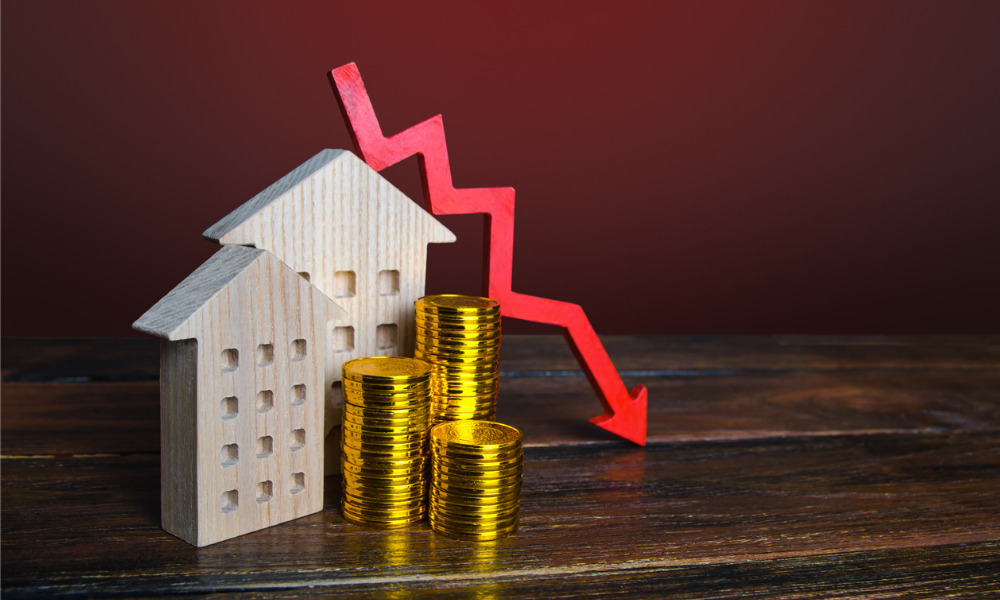Expert says "we are now seeing the end of constant increases"

UK house prices fell for the third time in the past four months, recording their sharpest drop since February 2021.
The latest Halifax House Price Index showed that average house prices went down to a five-month low of £292,598 in October from £293,835 in September – a decrease of 0.4%.
Halifax, however, noted that while the pace of annual growth also continued to ease, to 8.3% compared to 9.8% in September, average prices remain near record highs.
“Though the recent period of rapid house price inflation may now be at an end, it’s important to keep this in context, with average property prices rising more than £22,000 in the past 12 months, and by almost £60,000 (+25.7%) over the last three years, which is significant,” Kim Kinnaird, director at Halifax Mortgages, said.
“While a post-pandemic slowdown was expected, there’s no doubt the housing market received a significant shock as a result of the mini budget, which saw a sudden acceleration in mortgage rate increases. While it is likely that those rates have peaked for now – following the reversal of previously announced fiscal measures – it appears that recent events have encouraged those with existing mortgages to look at their options, and some would-be homebuyers to take a pause.”
Elliott Benson, mortgage broker at Sett Mortgages, shared the same observation as Kinnaird, saying that the mini Budget, or what happened after it, hit sentiment like a sledgehammer.
“And even though we all knew last week’s interest rate rise was coming, it will still have proved a further shock to many homeowners, especially those who took out sizeable mortgages at record low rates,” Benson added. “Higher rates mean people won’t be able to borrow as much, which in turn means they won't be able to offer as much for property. House prices will invariably head south during the next 12 months as people adjust to the new rate environment.”
Read more: House prices fall for first time in over a year, reports Nationwide.
The Halifax report found that property price inflation weakened across all buyer types during October, with annual price growth among homemovers falling to 8.9% from 10.3% in September.
More notable was the drop in property prices for first-time buyers as annual growth fell to 7.5% in October from 10.1% in September. Halifax said that with greater challenges for first-time buyers in deposit-raising and tighter requirements for higher loan-to-value mortgages, the relatively faster slowdown in prices was not surprising.
“Understandably, we have also seen consumer caution grow, as industry data shows mortgage approvals and demand for borrowing declining,” Kinnaird stated. “The rising cost-of-living coupled with already stretched mortgage affordability is expected to continue to weigh on activity levels. With tax rises and spending cuts expected in the Autumn Statement, economic headwinds point to a much slower period for house prices.
“While certain longer-term, structural market factors which support higher house prices – like the shortage of available properties for sale – are likely to remain, how significantly prices might ultimately adjust will also be determined by the performance of the labour market.”
Kinnaird added that currently, joblessness remains historically low, but with growing expectations of the UK entering a recession, unemployment is expected to rise.
“While it may not spike to the same extent as seen in previous downturns, history tells us that how this picture develops in the coming months will be a key determinant of house price performance into next year and beyond,” she said.
Avinav Nigam, co-founder of real estate investment platform IMMO, remarked that the annual slowdown in house price growth was expected in the context of today’s higher interest rates.
Read more: Reaction to biggest rate hike in decades.
“This impact is showing up in the data now, reflecting decisions made earlier in the summer when rates began to rise,” Nigam explained. “We are seeing property listings falling by 15 to 20% in some parts of the UK, as uncertainty encourages property owners to delay transaction decisions.
“As it becomes harder and more expensive to buy, demand for rental properties is expected to grow. Meanwhile, many smaller private investors are exiting due to higher finance and regulatory compliance costs. There’s a clear opportunity for professional providers of safe, quality, and affordable rental housing for the UK.”
Tomer Aboody, director of property lender MT Finance, said that we were now seeing the end of constant increases as buyers and sellers demonstrated more caution due to higher mortgage rates and the cost-of-living.
“As with any fall, buyer sentiment is key but considering external factors affecting everyday life, along with month-on-month increases over the past 18 months or so, the decline is still minimal,” Aboody noted. “With fewer transactions in the market, it will be interesting what move the government makes in terms of encouraging more activity, and whether mortgage lenders are more flexible on criteria.”



